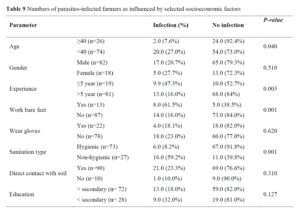Purpose: The response of sweet sorghum to biosolids application under different irrigation regimes was studied in a field experiment conducted during 2010 and 2011 in Central Greece. The study assessed the effects of soil application of biosolids on plant height, biomass production, and water use efficiency. Method: The experiment consisted of nine treatments with three […]
Purpose This study conducted to assess the presence of pharmaceuticals in soils and crops irrigated with treated wastewater in Oman. The study was aimed to evaluate the potential of plant uptake of four commonly used pharmaceuticals in Oman: amoxicillin, sulfamethoxazole, trimethoprim and ibuprofen by radish (Raphanus raphanistrum subsp. sativius) in soil culture. Methods Radish (Raphanus […]
Background: The swine production is a very important economic matter, occupying prominent position in the worldwide market. However, it appears as the greater impacting activity for the water resources. Researches point a swine manure production of 105.6 million m3 /year in Brazil, which resulted in a piggery wastewater rich in solids, nutrients, heavy metals, and […]
Two of the main concerns for wastewater reuse in agricultural irrigation are environmental and human security. Different research studies and practices have been developed recently in order to quantify the risk of possible environmental contamination of surface and groundwater resources as well as the risk to public health from enteric viruses. Other, far from negligible, […]
Purpose The aim of this research was to assess the health risk of textile wastewater reuse as irrigation water on leafy vegetable (Basella alba) by comparing variable growth rate in different ration of wastewater and freshwater irrigation and assess their soil-to-plant transfer factor (TF) and health risk index (HRI). Methods Pot experiments were laid out […]
Purpose Treated wastewaters are reused in agriculture to deal with the water deficit, especially in arid and semi-arid regions. However, they may contain contaminants such as heavy metals that can adversely affect the soil quality and life health. This work aimed to assess the degree of contamination of the soil and the turf leaves of […]
Purpose Because of the steep shortage in freshwater supply in the Israeli-occupied West Bank, raw wastewater (RWW) has been widely used to irrigate vegetable crops. This study aims to detect the effects of irrigation with raw wastewater on crops cultivated in Wadi Al-Far’a, Palestine. Method A total of 300 soil, crop, and RWW samples were […]
